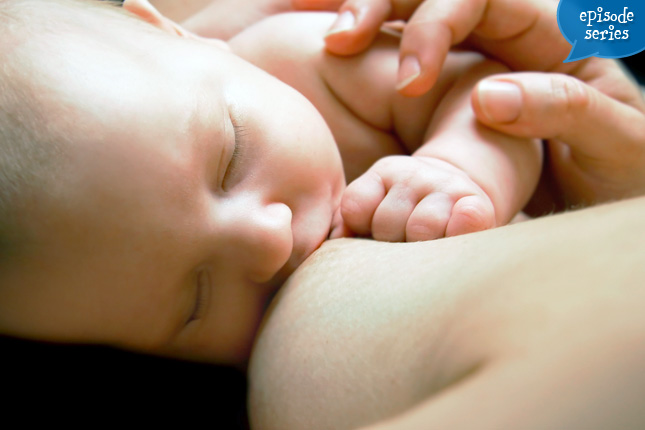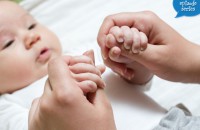The Boob Group
Breastfeeding Expectations: The Tenth Month
[00:00:00]
Please be advised, this transcription was performed by a company independent of New Mommy Media, LLC. As such, translation was required which may alter the accuracy of the transcription.
[Theme Music]
Robin Kaplan: A mother’s breastfeeding experience changes drastically over time, starting from her child’s birth through the month of her baby’s life. Today we continue our conversation in our series called breastfeeding expectations. Over 12 months we’re following three new mothers along their breastfeeding journeys, learning how they cope with breastfeeding challenges and settle in to the breastfeeding rhythm with their babies. This is the Boob Group.
[Theme Music/Intro]
Robin Kaplan: Welcome to The Boob Group, Broadcasting from the Birth Education Centre of San Diego. The Boob Group is your weekly online on-the-go support group for all things related to breastfeeding. I am your host Robin Kaplan. I am also an International Board Certified Lactation Consultant and owner of the San Diego Breastfeeding Centre. Thanks to all of our loyal listeners who have joined the Boob Group Club. Our members get all of our archived episodes, bonus content after each new show plus special giveaways and discounts. Subscribe to our monthly newsletter for a chance to win a membership to our club each month. Another way for you to stay connected is by downloading our free App available in the Android and iTunes marketplace. Today we are joined again by our three lovely panelists. Ladies, will you please go around and introduce yourselves? We’ll start with you, Jen.
Jennifer Oliver: Hi! I am Jennifer Oliver, I am 34 years old. I work in nonprofit administration and I have two kids, Fiona is three and she’s behind me earplugs in, working on my cell phone and Bryson is also with me today and he is 10 months, almost 11 months.
Cherri Christiansen: Hi! I am Cherri Christiansen, I’m 32. I work in consumer research and I have one daughter, her name is Cali and she is exactly 10 months old today, it’s very hard to believe. We’re going to try solids again.
Robin Kaplan: All right, Anney you go for it.
Anney Hall: Hi! Everybody, I am Anney Hall, I am 36 years old. I am an architect and I have one daughter, her name is Eleanor and she is just about 11 months old next week.
Robin Kaplan: All right. Ladies, well, thanks for being here and welcome back to the show.
[Theme Music]
Robin Kaplan: So, here’s an email that was sent from one of our listeners and this is from Katelyn and she wrote, “Dear Robin, nearly five months ago, I sat in my son’s room, a month from my due date and was searching the app store for something, an audiobook maybe, to listen to while I put his teeny clothes away. Instead, I found the Boob Group and I’m so glad I did. I knew I really wanted to breastfeed and took classes at a local pregnancy research center on breastfeeding, sign up for a week, read books and educated myself as much as I could throughout my pregnancy because by golly, I was determined.
I listened to many of the episodes the last three weeks of my pregnancy and it helped me be less overwhelmed by the thought of breastfeeding. Before I allowed my visitors in to meet my baby, I was sure to try and feed him. It was mildly successful. I think that having a non-breastfeeding mother hovering over me was more of a hindrance than I will ever admit to anyone but you. But she was trying to help. I will have to admit, however, that I committed some breastfeeding since in the hospital and soon after, pacifiers and supplementing on doctor’s orders due to severe jaundice or things I would change if I had to go at it again.
Even though I’m a sinner and I say that in the most sarcastic way, my son is almost four months old and thriving. We were able to ditch the formula after a couple of weeks, haven’t had any latch issues after the first week and this child is outgrowing his clothes faster than he can wear them. I am so proud of myself for sticking with breastfeeding and learning so much about it. I have become so passionate that I want to promote it to every new and soon-to-be mom. I have decided to begin school in the fall to become a Lactation Consultant and so other moms, that if I can breastfeed my son successfully anyone can. Thank you for being an unknowing guide to my career decision. If you have any advice I would love to hear it, thank you Katelyn.”
[Theme Music]
Robin Kaplan: Today in the Boob Group we are discussing with Anney, Jen and Cherri’s breastfeeding experiences have been like during their babies’ 10 month. So ladies, let’s just start it off. What is it like to breastfeed a baby in their 10 month and what’s your breastfeeding relationship look like right now, Jen?
Jennifer Oliver: I think right now it’s actually really well. We are not avid breast feeders over here, Bryson is kind of more interested in solids than he is in my boobs. But it helps when he is sick, he loves to breastfeed and then also he’s still kind of breastfeeding a lot at night. Sometimes it’s one to three times at night so that kind of helps to keep the supply up. And he’s actually not as distracted so now he’ll actually breastfeed through a full cycle of let down on both sides. But it’s pretty easy, but it’s not a big deal for Bryson.
Robin Kaplan: Yeah, I love that you brought up --- I’m sorry to cut, the other two reasons – but I love that you brought up how helpful it is when you’re baby is sick. Another reason why a lot of parents were actually or moms will continue to breastfeed even into toddlerhood because sometimes when kiddos don’t feel like eating anything else at least they know that they’re getting nutrients and it’s also very comforting. So, he probably totally ramped up your supply in the past two weeks or so with that with that nice little thing going.
Jennifer Oliver: I think so, because we’ve been, yeah – we’ve been sick for like couple of months straight between the two of them, so.
Robin Kaplan: How about you Cherri? What is breastfeeding looking like for you?
Cherri Christiansen: You know, it doesn’t look like different in nine months for me I think everything is pretty much the same. Cali is still nursing all the time especially when I come home from work and all night long. I feel like maybe she’s not nursing quite as much but don’t get me wrong, it’s still a lot because she was nursing so much before that even a little bit less is still way more than everybody else’s child. Night time behavior but and she is still not that interested in the bottle during the day from my husband she will take, you know just enough to get by as always. But I think I’m just fine with it. You know, when we’re together it’s great and as I’m more and more back at work and work is getting busier and busier and pumping is harder and harder for me to make the time. I love that I can just come home and right away she wants me and we nurse right away and it’s just the connection that kind of picks right up that even if I’ve been gone for eight or 12 hours. So, I’m really enjoying it, it’s going really well.
Robin Kaplan: Awesome! How about you Anney?
Anney Hall: It’s going really well, I’d say it’s – I feel like I’m at the end. But that’s just simply because of my schedule and maybe just where I am feeling. I don’t feel like she needs it as much. But we bottle during the day and she takes it just fine and we breastfeed first thing in the morning and then breastfeeds essentially before she goes to bed and that’s it. So, and then on --
Robin Kaplan: What about on weekends?
Anney Hall: -- weekend, it’s all the time. And it’s probably a little more often than she would during the week just because I can feel it coming and so it’s uncomfortable for me so I just put her on. I probably completely screw her up for the whole weekend. I don’t know what her schedule is all day because I’m in between just putting her on one side, putting on the other. But I still definitely – my left side is maybe an ounce in the right side is like five. And so I put her on one side so that she makes sure that she gets it and that there is something that comes out, she for sure gets more than the bottle, the pump does for sure. And then the other side I just – yeah. So, I’m absolutely lopsided but it works.
Robin Kaplan: That’s awesome! Ladies, what is your favorite part about breastfeeding a 10-month-old?
Cherri Christiansen: When she’s asleep. You know someone actually asked me this question yesterday not about breastfeeding but just kind of like moments of peace that I have in my life and if I could like box up a little moment of happiness like what moment would that be? And the first thing that I thought about was just kind of late at night when I really struggle to get it to sleep and when she’s finally asleep and she’s just laying in my arms nursing, sort of like side lying in bed or the exact same in the morning when I’m awake and she’s not awake yet and she’s just quiet and peaceful, because she has so much energy and I have so little energy. That it’s like in those moments where, I don’t need to have more and we’re just kind of, are both sort of giving each other exactly what we need. So yes, for me that’s probably my favorite moment although I love all of it. You know, those moments when I come home from work that I just mentioned were pretty great too.
Robin Kaplan: That’s awesome! How about you Anney? What’s your favorite part about breastfeeding a 10-month-old?
Anney Hall: Maybe the moment when she’s – right when she’s done.
Robin Kaplan: Yeah.
Anney Hall: Because either she’s – when she’s sleeping I mean. Like so now, it’s on the weekend and it’s just kind of all the time and she’s done and she’s just kind of rolls away and she’s ready to keep walking. And learn what she’s doing but it’s when she’s falling asleep at the end of the day and she kind of – she knows when she’s done and she kind of just moves her finger and she puts her thumb in her mouth and then she just kind of like snuggles in. But now lately it’s like she’s squirming because I know she just wants to go lay down. So, I try to hold on. But yeah, it’s that sweet quite moment. And I think that also now I don’t feel as desperate like this is her only source of sustenance and this has to – I’m, not desperate, I don’t feel nervous, it’s going okay and I’m actually not sore and so, I probably, it’s not funny my favorite part of breastfeeding is now I’m at like 11 months old and I'm almost done, that’s how I feel.
Robin Kaplan: Totally. How about you Jen? What’s your favorite part about breastfeeding Bryson at this age?
Jennifer Oliver: I think my favorite part at this point is just – when he’s fussy and he’s frustrated and there is nothing else I can console him it’s just that moment of knowing that, that I can console him and usually he will go from this like fussy state to this really peaceful state and it’s a really calming place. I remember with Fiona it was, she would breastfeed for so much longer and I had those moments that Cherri was talking about where she’s like so quiet and so peaceful and so nice and Bryson is so much shorter, that I did, those moments are so much shorter. And I still really relish that.
Anney Hall: I think I would say the same thing to you that it’s the little noises that she makes she’s – like she’s just it’s right there, you can’t wait any longer, which is so sweet.
Robin Kaplan: Well Anney, you know you had mention too that you don’t have to worry about it being like her just her main sustenance and you had had a question for me outside of this episode but you’re just asking about bringing home, may be not bringing home as much as you were before and how you’re not stressing out about that anymore and also just some thoughts about things that you can start introducing now that she’s actually 11 months old but how are you handling that right now with the amount that you’re bringing home, if you end up bringing home five ounces, but she may have taken more. How’s she doing with that?
Anney Hall: She’s fine. Well, and there so what happens is when I have my period through that cycle I make less. And I start to eat oat meal and I mean I’m eating it normally anyway but I start to ramp up on oatmeal and teas and stuff and then I just don’t worry about it and though I tried it one day and she went and had food and the milk and then she’s fed, she’s not going to die. So, and it’s only going to be a couple of days. It wasn’t like it was this transition where it was only three to four ounces a day for two weeks at a time. And so, I kind of let go and let my cycle process and then I ramped back up to like six ounces at work. And then I supplement with another pump that night. So, I just came to the realization that I’ll just work through that period of time and it’s fine and she’s eating fine and she eats like three times a day. And so I look at her and she’s fine like she’s not super skinny and she’s active and she’s fine. So, the only place I would start to worry is if I felt like there wasn’t something developed mentally she wasn’t hitting her target or milestones, yeah, which I think she’s fine. So, I’m okay.
Robin Kaplan: Very cool! I was going to mention too because you would me asked like, once I get to this point where I’m not producing as much milk on a regular basis or you’re starting to wean, for example, what can you switch to. And so, even at 11 months, at 12 months it’s kind of that time where pediatricians will start feeling comfortable with parents introducing cow dairy and even though a lot of families would actually introduce yogurt way sooner than 12 months but a lot of times what you can do even starting at about 11 months is looking at, coconut milk, for example, is a really highly nutritious and it’s not something I would switch to fully but the fact is you don’t need to, you’re still producing plenty of breast milk.
But for those times where you felt like she’s a little bit thirsty obviously, you can offer her water at this age too. But, coconut milk can be really good, hemp milk can be really good, rice milk is a little bit sugary and so but those are nice little complements when you’re doing solids and breast milk and if you feel like you need a little bit extra. And the only thing you’re going to look for is the same thing like when you’re doing solid foods is there an allergic reaction. Does my baby have an allergic reaction to coconut milk or to the hemp milk or whatever it is, and if they do then obviously it’s an allergenic food for them. But if it’s not, then those are really, really nice healthy fats and good substitutes, all right not substitutes but I should say complements to everything else that she’s getting so. All right, well, when we come back, Anney, Jen and Cherri will be discussing what solids their babies are eating right now and how to keep going to meet their goal of breastfeeding for a year and beyond. We’ll be right back.
[Theme Music]
Robin Kaplan: Welcome back! So, today we’re talking with Anney, Jen and Cherri about breastfeeding during their babies 10 month. So, Cherri how is that Cali doing on solids now?
Cherri Christiansen: She’s not.
Robin Kaplan: She’s still taking her time, huh?
Cherri Christiansen: Yeah, we haven’t really push it, I haven’t been in any huge hurry for a variety of different reasons and we kind of decided she’s 10 months today and we decided, you know what, may be today we’ll give her a little bit of avocado. So, we’ll see how it goes, we have plans this afternoon, we won’t be home for couple of hours so, I decided let’s just do it when we get home that way if there is like – if it takes too many hours or it doesn’t go well or, whatever I don’t have to worry about rushing to be somewhere. So, we’re going to try that so next month I’ll let you know it goes. But I’m not planning on necessarily like if it goes well, like okay now we’re going with this, you know it’s a solid --
Robin Kaplan: Oh, sure, sure.
Cherri Christiansen: --today or anything like that and we’re actually about to go on vacation which I’m very excited about it, it’s our first family vacation ever. And I’m always thinking if she was on solids it would be fine, but I'm almost actually thinking now that it’s, may be better to just that she’s not and we can wait till we come home to kind of go to it a little bit more seriously just because then I have to worry about food when we’re traveling, I can nurse her on the plane and I always breast milk wherever we are, I don’t have to pump, I’m so excited. I’m going to take a hand pump with me just in case but I don’t have to pump and then also because we cloth diapers and I will be traveling, with cloth diapers to Hawaii I’m thinking like, oh! It’s going to be so great that she’s not really on solids yet because that just one less thing to deal with like especially if I’m in a confined space like on a plane. So, we’ll see. I’m not in any kind of huge hurry and although I am starting to – unbelievable, starting to plan her birthday. And I’m now thinking like, oh my gosh, like wow! She’s – we’re definitely not going to have some sort of smash cake, even if we would, it would have been something super healthy like rolled oats cake or Garvey Syrup or something. But even now I was like, well there is no way we’re going to do that, if she hasn’t even like kind of bite of anything other than chewing on a carrot, there was choking on a piece of celery incident. But for the most part we haven’t done any food yet so, we’ll see no rush.
Robin Kaplan: Cool, very cool! All right, so I actually get this sort of question lot of doctors will actually start getting concerned that their babies aren’t getting enough iron initially because – so what happens is the baby’s iron stores that they’re born with are perfectly sufficient until babies reach about six to nine months. And then that’s when we start introducing iron-rich foods and things like that. And so, I’m curious for the ladies who have been doing a lot more solids. Are you finding that you’re using more iron-rich foods now that your babies are about 10 months old, or have you even thought about it, are you using iron, I know Jen is laughing, she’s like I know, all right. Well, I know of people, it is a common question that we get actually a lot is do breastfed babies actually need iron supplements?
Cherri Christiansen: Well, I would love to comment on this since I’m not doing food actually. I think I have a unique perspective. Not only are we not doing solids but I’m vegan, so people were, and I have history of being anemic. So, people like worry all the time and I know it’s a concern about, does iron transfer into breast milk and formulas or all supplemental with iron or not all of them but many of them.
And so, at her nine month appointment which I guess is about a month ago, which weren’t even going to go to other than he said, at nine months we do like to check the babies iron levels. And I was so nervous because I had to be just like, I mean I know it won’t be bad if there was something there but I’d heard that the supplements can be really binding and constipating and I just didn’t want to have to worry about it or didn’t want to start getting flagged from the doctor about the solids. And so, they said oh, well we can give you the results right now, it’s really quick which I didn’t know that.
So, I was waiting in the room and I had done some research about what time of day iron levels were highest and like I was going to eat certain foods, while I didn’t do any of that. So, I’m like okay well, whatever this is just as true a measure as I’ve ever seen and they came back, I don’t remember the number, I did write it down, but the nurse came back and said that Cali had the highest iron levels, that she had seen in any of the babies that she had tested in the last like six months. And I was like, what! So, I definitely walked out of that giving myself a little pat in the back and I was like something that’s all me and for anyone who criticizes my vegan diet or was concerned about, you can’t be vegan and breastfeed a baby, yes, you can. And I weighed her yesterday and she’ like – I mean she’s just enormous, she was teeny-tiny only like six pounds when she was born and she’s like almost 18 pounds. You know what, and that’s all breast milk and no iron issues. So, not to say that it doesn’t happen, but I just wanted to share that --
Robin Kaplan: No, no and I love that you did because I think the most important thing is if you’re wondering get it checked out. Because that’s the thing too that I always recommended and I’m sorry again to cut the ladies off because I do want to hear if you guys are considering that as part of your – what you’re feeding your kiddos. But the whole thing with the iron supplementation is if it’s being recommended just get your baby tested. If they’re testing fine, you don’t need them because you’re right, they can be very binding and constipating so who needs a constipated baby? I mean, that’s just gassy and uncomfortable. Anney, what kind of foods has Ele had it, are you thinking – what I mean is she on meats, I know she’s on meat because she ate buffalo a couple of days ago. But meats, beans, lentils, leafy greens things like that are you finding you’re able to slip in to her rotation of foods?
Anney Hall: Well, and so I didn’t know anything iron levels other than my own which I have been taking supplements because I’ve had just little dizziness here and there. But I did introduce meat, we had meat at Robin’s house which is really cool and so I made her a pasta which I put kale and carrots and things inside, hid it inside. And then so she eat the Quinoa Noodles and the buffalo and she loved it, it’s all over her face. And I give her
Cherri Christiansen: I’m vegan and that sounds delicious.
Robin Kaplan: It’s really good.
Anney Hall: So, and then I give her chicken yesterday for the first time with and I had made a while ago, I had made a lentil and carrots and something else mixture. And when she first tried it, she was like, blah, blah. Like the lentils they just has a distinct flavor but I knew it has really great protein and iron and –
Cherri Christiansen: Lentils are great.
Anney Hall: So, I have been giving her that too. So, now that – well and I was just knowing that sort of meat so it was a good time to introduce now. So, now that I know about iron, I’ll be conscious of sort of the greens too. And all the way through I’ve given her like kale and spinach with banana, I mix those two together. So, I don’t think that she’s – I think she’s sucking the iron out of me.
Cherri Christiansen: Did they test at all at the pediatrician?
Anney Hall: I don’t know because just he went, so my husband and I don’t. He was like I don’t know I said well, how much does she weight and he goes like I don’t know. What do you mean you don’t know, I need to know these things and that –
Cherri Christiansen: That is why I take off work every time and do it myself.
Anney Hall: I’m going to go, I’m going to go next time. But he found the paper and she weighs 19 pounds and something. I thought that she was heavier than that.
Jennifer Oliver: I think Bryson is close to that.
Anney Hall: I’m pretty sure he is more.
Jennifer Oliver: He’s like 22.
Cherri Christiansen: Cali’s so light weight, she’s 17.7 and I thought that was a lot.
Robin Kaplan: She started smaller than now --
Cherri Christiansen: She did.
Anney Hall: At least a month ahead, that’s true.
Robin Kaplan: Jen, what is Bryson eating right now?
Jennifer Oliver: He’s eating everything, so anything that you put in front of him. He had crab, shrimp and lots of beans, lots of vegetables. I do a lot of blending which really rub the end of that because he’s so not interested in blended food. He wants to pick it up, he wants to spoon himself --
Robin Kaplan: Awesome!
Jennifer Oliver: He’s doing, he’s doing really great. And he just does not like it when anybody eats around him and it is not his. And also if you’re eating anything different than him, that is not –
Cherri Christiansen: I’ve wondered about that.
Anney Hall: So, he will notice that?
Jennifer Oliver: Oh yes. And he gets really angry.
Robin Kaplan: He’s so funny.
Jennifer Oliver: So, you’ll have your food, the food that you’re giving to him and then all have whatever I’m eating over on the side and he’ll point me and go uh, uh like this and then I’ll try and continue feeding him the food I was feeding and he will push it away.
Robin Kaplan: Awesome! Well it makes cooking easier if you know how to make different sausage.
Jennifer Oliver: It’s getting to a point now except for that I still have to make different dishes for Fiona. She really just wants to eat ketchup and that’s really it. And she just dips her fingers. So, as far as iron I have to say that I’m terrible. I don’t even know what iron rich foods are.
Robin Kaplan: I will say even it’s not even that big of a deal to as long they’re eating food.
Jennifer Oliver: You know what, they gave us drops for Fiona and for Bryson, Bryson – I mean Fiona breastfed much longer and didn’t eat solid quite as quickly. And I had met with this really fantastic doctor who’s actually retired. He was just volunteering, coming in and helping. And he looked at me and he’s like, you know that is waves, and round the vitamin D wave, and he was like, do you take her out into the sun, I mean without sunscreen? And I said, well, yes of course, and he’s like, no, really I mean do you let her get sun on her body and you know and don’t lather her up but just let the sun enrich her body like at least once a day. And I said yeah, I think so and he said, then she’s getting vitamin D.
Cherri Christiansen: That’s so funny.
Jennifer Oliver: So, and he was very sweet about it and then I had another doctor who said this is and this and this was great too. She was like Vitamin D doesn’t hurt them and I said well yeah, that’s true. She said, so why not just give it to her. And I say yeah, it’s a good point too. So, I mean – to be honest, I’m lazy, I’m not really interested in doing the vitamin D drops so I just haven’t done them. I haven’t been tested it so I don’t their levels but they are super healthy, both of them. So, I’m not really concerned about it. But that was different feedback I got. I think whichever one you subscribe to, I think both are great. It doesn’t hurt them so if you’re going to give him, just give it to him.
Cherri Christiansen: And I think with the amount of food that Bryson’s eating and the variety of food like I won’t be worried about an iron deficiency.
Anney Hall: Not at all, not at all.
Robin Kaplan: I had never even thought about it when I was feeding my kids at this age and I was actually its – and I hope my pediatricians not listening but we brought them in, you know at six years and they want to do an iron test. And I was like have you met my kid, he has so much energy and I know that does not always the big, you know, the main thing. But a large sign is lethargy and I was like my – I mean, he bounces of the walls all over the place I’m like I promise you when he’s showing signs.
Cherri Christiansen: I need my iron levels checked actually.
Robin Kaplan: Postpartum mom is a little bit different, I mean he’s a six-year-old. But again, no there are signs of iron deficiency and I said as soon as I see those, I’ll let you break his finger. But until then – but --
Jennifer Oliver: You know, I think one of these – a lot of these topics about being deficient for this, or having to supplement for that, a lot of it just comes from formula because breast milk is just breast milk. But then we see the formula that’s fortified with this and has vitamin D and iron and AHA and omega threes and omega sixes in this and the other and then all of sudden, you know not enough to knock the formula cup, well, I love knocking formula companies. But, it’s sometimes that it makes us feel deficient like well, do we have all of that, like I don’t have extra.
Robin Kaplan: I love that you brought that up. The reason is, just that iron in breast milk is bio available. So, the amount of iron in breast milk is actually lower than in other substances because it’s so readily available that the babies can take it in and process it the way that they need to. When we get it from as adult even we get them in supplements and things like that. We have to take them in larger dosages because our body doesn’t know how to break it down when it’s in a foreign substance. And so, that’s why things like Floradix for example, is an easy way for us to get iron as adults to take it in that form because it’s already pulverized super foods. And so but anything in pill form or when we’re getting iron drops things like that iron supplemented in the formula, for example, it’s because the body doesn’t know to break it down well so they have lots of higher things.
So, you’re right when we’re comparing breastfed babies to babies who are getting fat in other ways, it’s different, we have to supplement with certain things because those substances don’t have what breast milk has. So, whereas a lot of us with the formula marketing companies does such a good job because they’re showing that it has all of these and so a lot of times breastfeeding moms feels like does mine have that? Just remember they are always trying to make it as good as breast milk. Keep that in your mind. Yes, you have all of that stuff in there, they’re always trying to compete with us. And so, that’s where they do a good job at marketing, they get a lot more dollars than us breastfeeding moms with boobs. But anyhow, I did want to ask one final question and I know they were coming up in a year and for Anney, you had mentioned that was kind of your first initial goal. Jen, I know you were kind of, you know looking at a year or two Cherri you’re kind of going for two and so, how are you guys staying motivated to just keep going on? Jen, how about you?
Jennifer Oliver: You know, I think I stay motivated as long as he stays interested. So, that’s sort of an easy motivation. If he’s interested and I only work five hours a day so that’s a little bit different than Anney in terms of I don’t have to work as hard at pumping. I have to say that lately, I have not been pumping. Or like pumping once haphazardly, it’s just I’m not working that hard at it. But when I come he’s interested still and it’s occasional but it’s enough. And I do know with Fiona that I breastfed her I think 18 months, 19 months and I wasn’t really supplying all that much towards the last six months or so. But it still was enough, like it’s still kept coming. So, it’s like even though it’s not like coming in full and a lot, it still comes and it’s still enough to satisfy her and give her that comfort that she wanted and so for Bryson I think. As long he wants it and it still comforts him than I’m probably going to do it.
My only fear is that I have a trip on this coming week to New York and then in two more weeks I have another trip to Fresno all for work and I’ll be gone for like five days, four days and it’s a whole lot of pumping. And I’m so not that interested in pumping. So, my only – part of me which is – I wish I’d just wean him before these trips because I don’t want to do all this pumping. But then, the other part of me thinks that no, I’ll be really sad about that because it will be forced and I’m not really interested in forcing anything so.
Robin Kaplan: How about you Anney?
Anney Hall: I am getting really used to the idea of not pumping at work, really a relief.
Robin Kaplan: And I know, and you can. Like a lot of women stop pumping around this time, 10, 11, 12 months too.
Anney Hall: And I’ve made it through the day where I didn’t really need to and as soon as I got home I pumped if she wasn’t ready to – all right, fed her you know, whatever. So, the idea of just feeding her in the morning and at night is starting to sound really good. I’m not ready to be done, I’ve recognized that. So, I don’t know what it’s going to look like over the course, we have a big trip that I kind of wanted to be any good place for in June. So, if that meant in the morning and at night that’s all we did during the day that would be okay with me. And then kind of wean her towards the end of July, I think that’s what I’m planning. Because at the end of July I have a weekend trip, where we’ll just be gone without her, which will be really scary.
Robin Kaplan: So yeah, how about you Cherri?
Cherri Christiansen: I’m not really struggling with motivation. I think, for me we – I don’t even know where to start. We struggled so much at the beginning. We had so many problems, the oversupply, the Raynaud’s, the overactive let down, the pain, just everything. That and we work so hard to get to it, that now that we’re in a good place, I’m like I’m not in any rush to give up. But at the same time just like Jen mentioned, I’m interested as long as she’s interested. So, even though I have this goal of going for two years, if she woke up and was 14 months and decided she was done, I’d be sad but then that would be her choice. But I just wanted – for sure definitely get through to a year and I feel like that’s definitely easy. I kind of have that one in the bag and we’ll just play it by an ear and hopefully, it won’t look the same, the second year as the first year and I’m really looking forward to not having to pump at work.
I’m pumping, I used to pump twice a day, now it’s like maybe two-three days a week I pump twice a day and then the other half of the week it’s only once. And I’m gone a lot longer than Jen, I mean sometimes I have to eight to 10-hour shift but it is what it is. I do notice that when I only pump once, I do get a lot of milk because I’ve gone a little bit longer, I don’t pump at the same time. So, if I normally pump at 10:00 and I’m going to only pump once it’s – it’s not planned, it’s usually like, it’s noon I haven’t pumped yet crap and then it’s 12:30 and then I’m like well I’m going at five so whatever. And I still have enough milk to give her so it hasn’t been an issue. So, I just, I just keep going and I – that I have my days, where it sucks but those are few and far between and I usually just focus on getting through the one day.
Robin Kaplan: Cool! All right, well, thank you so much ladies for your sharing of your experience with breastfeeding your babies for the tenth month of their life and for the Boob Group Club members our conversation will continue after the end of the show as Anney, Jen and Cherri will discuss how ant-flow has affected their supply. For more information about our Boob Group Club please visit the website at newmommymedia.com.
[Theme Music]
Robin Kaplan: Before we wrap things up, here’s Lara Audelo talking about ways to overcome societal booby traps.
Lara Audelo: Hi! Boob Group listeners, I’m Lara Audelo, a Certified Lactation Educator, The Retail Marketing Manager at Best for Babes and owner of MamaPear Designs. I’m here to answer some of your most common questions about how you’re going to achieve your personal breastfeeding goals without being undermined by cultural and institutional booby traps.
Such as what have I missed about labor medications and their effects on breastfeeding. Pain medications are routinely used during labor. With some hospitals dosing epidural rates as high as 98% and 99%. And while they may not affect your baby’s health they can affect your baby’s ability to breastfeed any immediate postpartum period. Research is where we get the information we need to make recommendations and this evidence-based information needs to make its way to mothers. Otherwise, it’s just another booby trap.
The impact of birthing practices on breastfeeding. Orlando Smith has to say, injections end of the epidural space are quickly detectable in cold blood. Pain relief drugs cross the placenta and reach the fetus or infant very quickly in a matter of seconds to a few minutes. The drugs are designed to numb sensory nerves in the mother and therefore they also affect sensory and motor nerve in the infant that affects rooting, sucking and breathing. One common myth is that once the medication has worn off in you, it has also worn off in your baby. Not so with the number of drugs, the pediatric half-life, a measure of the duration of medication in your system, a new labor medication is higher than the maternal half-life meaning they may affect your baby’s ability to breastfeed after you no longer feel the effects.
Another myth is that there are forms in medication that don’t get to the baby. And the truth is all drugs taken by the mother reach the baby. And the third myth, there is a standard epidural which all in anesthesiologists use. The truth is that epidural can vary. Both in terms of the medications used and of the dosage. And of course, the dose you and your baby get depends on how long you have one. Other consequences of epidural can affect breastfeeding because they lead to obstetric intervention which can ultimately lead to cesarean birth. Epidural use also raises the risk of maternal fever, infant fever and consequence separation of mother and baby for the evaluation and treatment of those conditions. Should you choose pain medications in labor, you can still have a wonderful breastfeeding experience.
Best for Babes believes that you deserve to know what the evidence says about labor medications and breastfeeding and that you deserve support, should you experience breastfeeding difficulty for this or any other reason. A special thank you to Tania Riverman, IBCLC for writing the Booby Trap series for Best for Babe. Visit https://www.bestforbabes.org for more great information about how to meet your personal breastfeeding goals, and my business www.mamapeardesign.com for breastfeeding supportive wearable. And be sure to listen to the Boob Group for fantastic conversations about breastfeeding and breastfeeding support.
[Theme Music]
Robin Kaplan: So, this wraps up our show for today. We appreciate you listening to The Boob Group. Don’t forget to check out our sister shows Preggie Pals for Expecting Parents, and our show Parent Savers for Moms and Dads with Newborns, Infants, and Toddlers. Coming up next week we have Barbara Robertson from the breastfeeding center of Ann Arbor discussing introducing solids to your breastfed baby.
Thanks for listening to The Boob Group; Your Judgment Free Breastfeeding Resource.
[Disclaimer]
This has been a New Mommy Media production. Information and material contained in this episode are presented for educational purposes only. Statements and opinions expressed in this episode are not necessarily those of New Mommy Media and should not be considered facts. Though information in which areas are believed to be accurate, it is not intended to replace or substitute for professional, Medical or advisor care and should not be used for diagnosing or treating health care problem or disease or prescribing any medications. If you have questions or concerns regarding your physical or mental health or the health of your baby, please seek assistance from a qualified health care provider.
[00:36:05]
[End of Audio]












